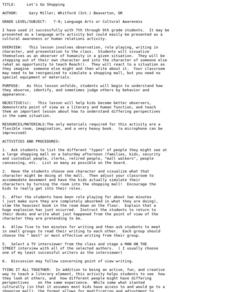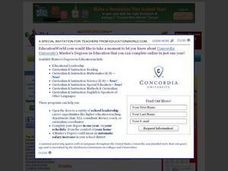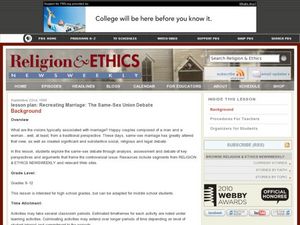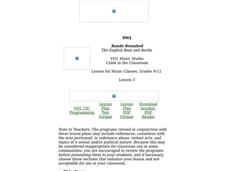Curated OER
In the Future we will all be Mixed Bloods and Mestizoes
Students examine the concept of origin and ethnicity. In this ethnic studies lesson, students engage in a variety of interdisciplinary activities including posters, and discussions to better understand our past and future.
Curated OER
Up From the Streets: Hip Hop as a Recognized Art
Students discuss the historical roots of Hip-Hop to the present as an example of an art form that arose from the street into popular culture. Emphasis is placed on in-class discussion and written reflections in this introductory lesson...
Curated OER
Let's Go Shopping
Students explore how to become better observers, demonstrate point of view as a literary and human function, and learn an important lesson about how to explain differing perspectives in the same situation.
Curated OER
Back to Basics
Students examine the unique and diverse historical artifacts that people have designed to fulfill their everyday needs in extraordinary ways. They identify ways humans have used design throughout history to enhance the ways they meet...
Curated OER
Proverbs of One World
Bring your class to the computer lab, and have them use the library and online resources to select proverbs related to specified themes. They create a book or bulletin board of proverbs that offer lessons connected to themes of freedom,...
Curated OER
Recreating Marriage: The Same-Sex Union Debate
A debate continues regarding same-sex marriage as a constitutional right. This lesson requires learners to define marriage then formulate an argument that reconstructs the national debate perspectives. Many standards are addressed but a...
Curated OER
Two Sides, Same Coin: How Political Beliefs Influence Language Use
Learners read several magazine articles on the same topic written from different political perspectives, paying particular attention to the diction, syntax, and arguments presented in support the point of view expressed. They then select...
Curated OER
Passport to Africa
Middle schoolers begin the lesson by reading a novel about the diversity of geography in Africa. They are to create an oral report based on information they research. They also communicate with someone through email about the situation...
Curated OER
Introduction to Tibet
Students examine Tibetan history and geography. In groups, they analyze and discuss different perspectives regarding the Chinese occupation of Tibet. Students discuss current events and their significance. They write an article and...
San Bernardino Co. Supt. of Schools
Was Julius Caesar a Good Leader for Rome?
Learners consider the various perspectives that different groups in Roman society may have had for Julius Caesar, such as Roman soldiers, senators, the working class, and slaves. The primary activity involves a reading of Caesar's...
Curated OER
What Is Important to Me?
Students respond to prompt with awareness of personal value of possessions. They list the criteria used to determine worth and value. They listen and ask questions or add comments and check their own measures of value with those the...
Missouri Department of Elementary
Origins: A Simple Word Game For Use In Human Relations Trainings
Words can hurt. Words may not break bones but they can break a heart. An activity focused on the meaning of and the history of some often heard words and phrases is designed to raise awareness of the importance of choosing words...
Curated OER
Check My Writing
Students practice the process of writing letters to students in other countries. This activity is highly motivating for them to write and interactive with diverse cultures. The use of technology should be considered with the use of e-mail.
Curated OER
The Spirit of Islam
Young scholars do six different lessons that have many activities which help them to gain an understanding of Islam and Muslim people and how people must work together to combat stereotyping.
Curated OER
A Day at Mount Vernon
Students discover daily life on George Washington's plantation, Mount Vernon. In this compare and contrast lesson, students examine the life styles at four distinct sites at Mount Vernon to become familiar with the people,...
Curated OER
Bands Reunited: The English Beat and Berlin
Students listen to and discuss popular music that addresses political and social issues of oppression, but in a joyful way. They role play as artistic teams and plan a music video that may be used for a specific song.

















